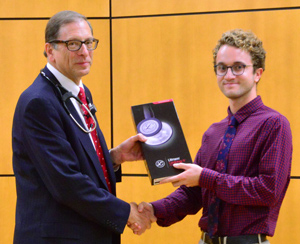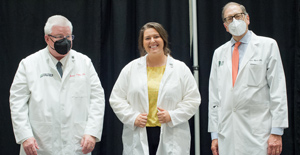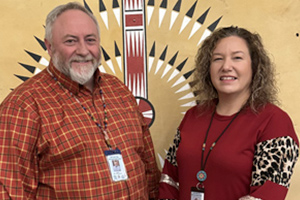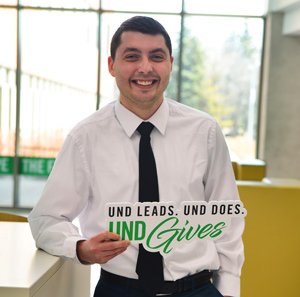Rural Realizations
By Stacy Kusler on
Medical students are assigned many rotations, or other clinical experiences, throughout their four years of medical school. For those in their first two years, opportunities for short shadowing experiences are available for a glimpse at a community or facility. In the later years of medical school, longer and more formalized rotations fill their schedules.

Dr. Wynne.
Some of these later rotations include those in rural areas of North Dakota. Cody Riggle (MS4), Mercedes Hoffner (MS1), and Eric Leveille (PGY1) are only a few of the current of former University of North Dakota (UND) School of Medicine & Health Sciences students who took on a rural rotation. To get a direct take on the value of rural training, they shared how their rural experiences during medical school shaped their view of what rural practice means and what they hope to carry forward in their medical school and professional practice journey.
A Deeper Understanding

Mercedes Hoffner is nearing the end of her first year of medical school. While official rotations don't start until about the third year of medical school, Hoffner heard about RISE – the Rural Interprofessional Shadowing Experience available to health profession students at UND – through the UND Center for Rural Health and wanted to get out and experience rural healthcare settings as soon as possible.
Hoffner chose to shadow at Spirit Lake Health Center (SLHC) in Fort Totten, North Dakota, this past fall. There, she was paired with Dr. Jeffrey Vaagen, both a family medicine and internal medicine physician, who has been with the organization since 2016. A UND grad himself (MD '94), Vaagen showed Hoffner that addressing family and community health, in addition to physical health, is of utmost importance to patient care.

SLHC.
Given her passion for public and community health, and, since COVID-19, population health, Vaagen's background struck a chord with Hoffner.
"I was blown away by Dr. Vaagen's close relationships with his patients and how patients opened up to him about sensitive topics," Hoffner said, noting that he would spend nearly an hour with some patients to understand them better. "I hope, in the future, I can take time to listen to patients like he does and learn about their entire well-being so I can provide better care for them," she said.
Our students get to experience some of the rich culture that we serve and see our relationships with our patients.
Dr. Vaagen defers the praise of being a great teacher to the community members. "The Spirit Lake Oyate – or, community – are the real teachers," Vaagen says. "Our students get to experience some of the rich culture that we serve and see our relationships with our patients."
Additionally, Hoffner was amazed by the resources available in a small clinic, something that Vaagen says is a common surprise. "My preconception was that a lot of referrals took patients to larger cities," Hoffner said. After being on-site and experiencing how patient care was delivered at SLHC, Hoffner saw the importance of having many services already on-site that they could literally walk their patients to. "It made me more excited about rural health and the potential of serving a rural community. I realized I wouldn't have to sacrifice quality of care or diagnostics because of being located rurally," she said.
While Hoffner's experience was short, it made a lasting impression. "I had so much fun," she said. "The experience helped give me a more realistic view of practicing in a rural area."
"I want to be like Dr. Bob"

Eric Leveille (MD '22) and Cody Riggle both spent time in Tioga for clinical rotations. Riggle was there during his fourth year and Leveille did two separate rotations; one in his third year and again in his fourth. "It was such a good experience that I wanted to go back," Leveille said.
Coming from the state of Michigan, Leveille had never been to rural North Dakota before his first Tioga experience. He was surprised by quite a few things. "The landscape was one thing, but I was more surprised that someone like Dr. Bob was out there to begin with," he said.
Dr. Bob, of course, is Dr. Robert Rotering. Affectionately known to his students and patients as Dr. Bob, Rotering joined Tioga Medical Center (TMC) in 2016 after a colorful career in global medicine. He came back to his home state of North Dakota in the name of service after traveling the world to provide medical care to the underserved. Now, Rotering is taking on medical education by storm. In his seven years at TMC, he has bolstered the site's medical education program, instructing about 15 health profession students every year.
Even as a super busy physician, he still made us a priority without feeling rushed.
"Tioga is the best site to do a rural rotation at," says Riggle. "I felt like a full-fledged physician there. If I made mistakes, Dr. Bob would be patient with me and help guide me. Even as a super busy physician, he still made us a priority without feeling rushed," he said.
Leveille agrees. "Dr. Bob really makes sure his students get the full experience of being the doctor," he added. "He really lets you take the lead and have ownership – with supervision and feedback – of the patient and their care, which prepared me going into residency."
Riggle also noted that he was shocked by the number of specialists available to patients in the small rural community of Tioga. Rotering and the TMC team have worked hard to develop specialty care services there, and now have monthly visits from specialists in cardiology, endoscopy, general surgery, orthopedic surgery, foot and ankle services, sports medicine, pediatric oral surgery, and mental health.
Rotering makes sure the students spend time with as many of the specialists as possible for expanded learning opportunities. "In Tioga, I never would have guessed you could get exposure to all those specialties," Riggle said.
Beyond the experience of patient care in the clinic and hospital setting, both Leveille and Riggle took other lessons away. Leveille learned from Rotering that a rural lifestyle affords the opportunity to combine passion with practice. Leveille is a former participant in the UND Indians Into Medicine (INMED) program and wants to incorporate indigenous health into his profession. Rotering took note of his interest and invited him to go along with him to a Pow Wow at a nearby reservation. "He has so many connections, and he knew everyone there," Leveille said. "He showed me that, yes, I can incorporate my passion into a rural health career."
Riggle too left with a renewed sense of excitement about his future career path. "One of my goals is to provide psychiatric care to a rural area, and my time in Tioga showed me how important it is to have services in these locations," he said.
Physicians Weigh In
TMC and SLHC, though located 215 miles apart, have one major thing in common: physicians who are driven by a passion for showcasing their rural community and their love for rural practice, thorough teaching, and a drive to sustain their rural health facility.
Vaagen says the profession of medicine lends itself to teaching. "The word 'doctor' from its Latin origin, means 'teacher.' Most doctors are lifelong learners. It is only natural to share that knowledge through teaching," he said.
Many [students] have their most beneficial experience in the smallest rural settings, and many of our best [physicians] choose rural practice for quality of life and practice opportunity.
Rotering has a fiery enthusiasm that rural is better. "Many [students] have their most beneficial experience in the smallest rural settings, and many of our best [physicians] choose rural practice for quality of life and practice opportunity," he said, explaining how he has his eye on the future of rural healthcare as a whole and sees teaching as the key to rural sustainability.
"If we want to staff the rural underserved areas, then expose the students to it. Address the myth that academics, teaching, and healthcare are better in big cities. I've been all over the world, and I am telling you it is not," he said.


 is the connection between rural healthcare facilities in North Dakota and qualified health professional job seekers. As the workforce specialist, she assists rural facilities to attract medical providers and other health professionals to their communities by sharing job opportunities. Through her position, Stacy is working to reduce the healthcare workforce shortages throughout the state.
is the connection between rural healthcare facilities in North Dakota and qualified health professional job seekers. As the workforce specialist, she assists rural facilities to attract medical providers and other health professionals to their communities by sharing job opportunities. Through her position, Stacy is working to reduce the healthcare workforce shortages throughout the state.



